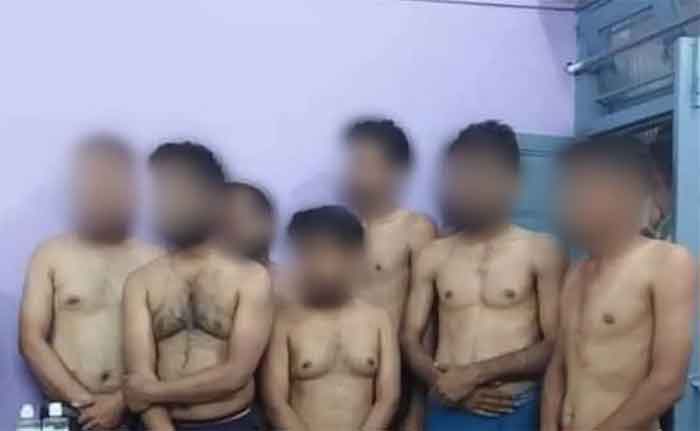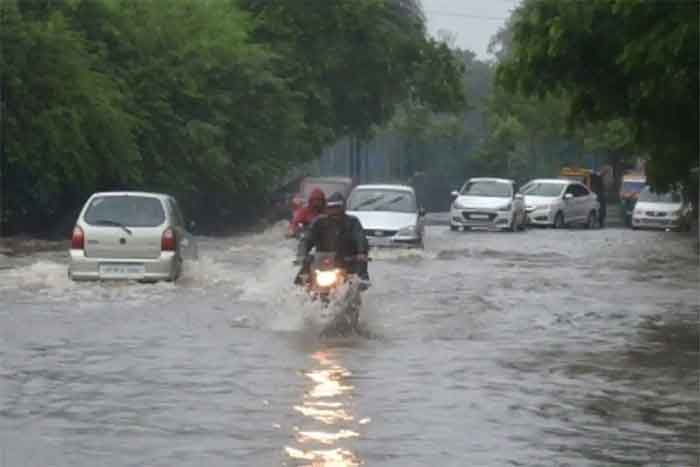
In early April this year there was outrage across the country when photographs emerged of eight journalists and theatre artists stripped to their underwear in a police station in Madhya Pradesh. They had been arrested by the police in Sidhi district on 2nd April over a protest against the arrest of theatre artist Neeraj Kunder, at the behest of a ruling party MLA.
The arbitrary arrest and humiliation of those protesting against police and politicians was in continuation of a long history of autocratic behaviour by those controlling state machinery in many parts of India. The problem seems to have worsened during the period of the Covid pandemic, which saw authorities concentrate even greater power in their hands under the guise of safeguarding ‘public health’ or ‘controlling infection’.
“The incident of mistreatment of journalists and theatre workers by the police in Sidhi district of Madhya Pradesh was a clear human rights violation. It was extraordinary because their stripping and photographing for release on social media showed the inhuman depths to which those in power have descended” says social worker Rajkumar Sinha. While human rights violations against tribal communities and the poor is commonplace in Madhya Pradesh according to him the targeting of journalists and theatre artists is meant to create fear among educated people also.
 Rajkumar Sinha, who works in the state to save water, forest and land, points out that during the Covid period the rights of government servants to register protest democratically were also crushed with violent attacks by the police. Social workers fighting peacefully to save the forests in the state have also been treated like criminals. Hundreds of such incidents of human rights violations have come to the fore.
Rajkumar Sinha, who works in the state to save water, forest and land, points out that during the Covid period the rights of government servants to register protest democratically were also crushed with violent attacks by the police. Social workers fighting peacefully to save the forests in the state have also been treated like criminals. Hundreds of such incidents of human rights violations have come to the fore.
“The fear all around is such that many feel that nothing will be achieved by speaking about your pain, so it is better to remain silent” he says.
Rajkumar Sinha is an active member of the Chutka Atomic Plant Pratishtha Sangharsh Samiti formed to save the Adivasis along the Narmada river from the ill-effects of the proposed Chutka nuclear power plant. In 1985-86, the exercise of exploring the possibility of generating electricity by setting up a nuclear plant in Chutka village of Mandla was started. This scheme is proposed on the banks of the Narmada river, the lifeline of MP. Chutka is the same village which has been displaced due to the Bargi dam built on the Narmada river in the past.
Rajkumar Sinha is also one of those social activists who vehemently opposed the proposed plan to cut 2.5 lakh trees for the diamond mine at Bakshwaha in Chhatarpur district during the Covid epidemic and faced harassment from the Forest Department and the police.
The incident of misbehaviour with journalists and theatre workers in Sidhi district happened as some of them had raised their voices against a local MLA of the area. They were not only undressed but also photographed by the police in a semi-naked state and the photos were later posted on social media. The police claimed, to much public ridicule, that they had stripped those arrested to prevent them from attempting suicide by using the cloth to hang themselves.
Bhupendra Gupta, who had been an advisor to former Chief Minister Kamal Nath of the Congress party and now vice-president of the media department of MP Congress Committee, wrote recently that ‘Were they so humiliated or tortured that the police feared that they might have committed suicide? This new and great way to prevent suicide should definitely be a part of the syllabus of police training colleges’.
He further writes “this Stone Age exercise in the Jet Age is also a reflection of the mentality of the fanatics in power. The question is whether the police did any investigation before committing this act? Or did they do it to impress the legislator who was criticised by the journalists?’.
Like Bhupendra Gupta, many intellectuals have reacted to this incident which violates human rights across the country. Following the public outrage the MP government suspended two police officers. The very next day, the MP Human Rights Commission had also taken cognizance of this incident.
Incidents related to human rights abuses have been reported regularly during and after the Covid epidemic in MP. In the second week of March 2022, the Indore Police had beaten up a young man, who had also been stripped half-naked. The policemen not only took off the clothes of the youth, but also beat him up with kicks and punches. The incident was captured by passers-by on their mobile phones and later went viral on social media. The Indore police commissioner suspended three policemen of the Hiranagar police station.
During the second wave of the Corona epidemic last year, government servants who were protesting peacefully in a democratic way were beaten up with lathis by the police. Hundreds of employees were locked up in the police station. The FIR was filed against them and some employees were expelled from the districts they were living in.
Pratap Singh Badal, who has been the president of a big employees’ organization, says that thousands of affected employees started a dharna in protest against the government in support of their various demands. Then the police showed brutality. He says that the government has been doing injustice since then by not withdrawing the cases against the employees. Similarly women selected as teachers after passing an eligibility test were chased and badly beaten up in Bhopal last year when they demanded that they be given appointment letters.
A year and a half ago, a tribal was killed after a beating by policemen in Mohda police station of Betul district, while Pradeep Damor, a youth lodged in the custody of Rajgarh police station, committed suicide. The Human Rights Commission had taken cognizance in both the cases.
Pooja Yadav is a journalist based in Bhopal, Madhya Pradesh













































